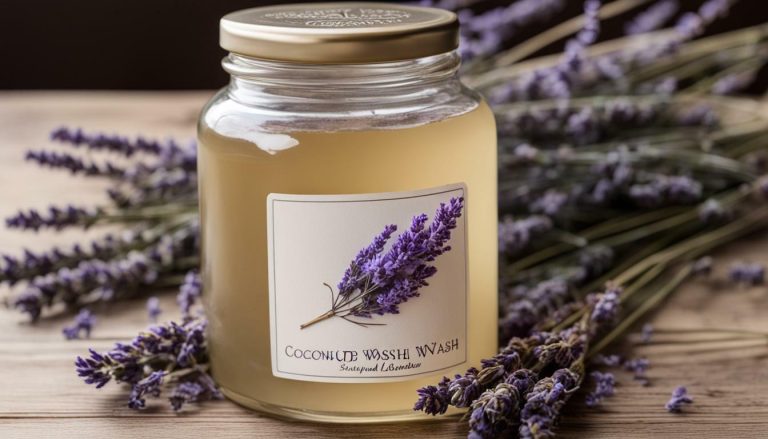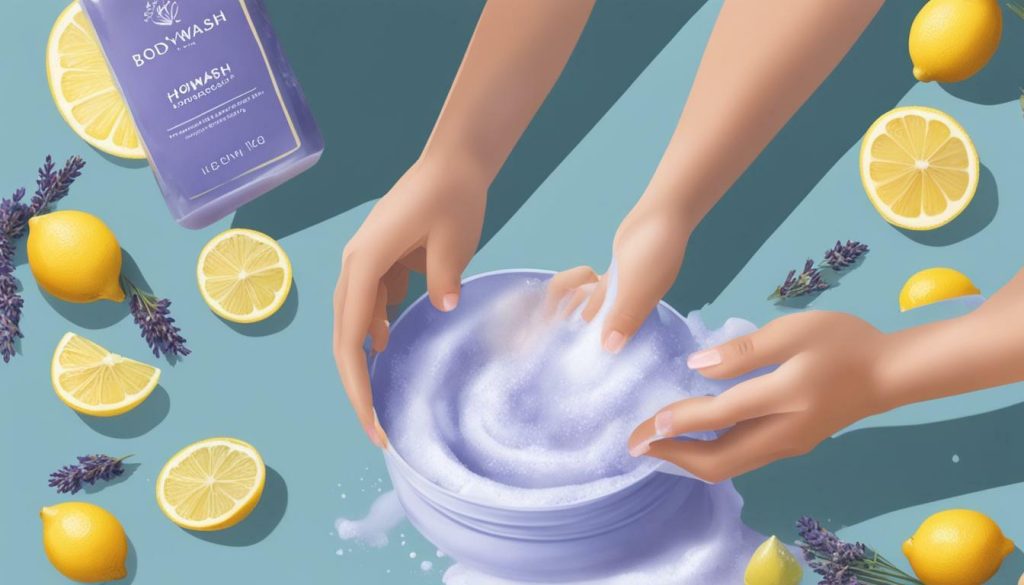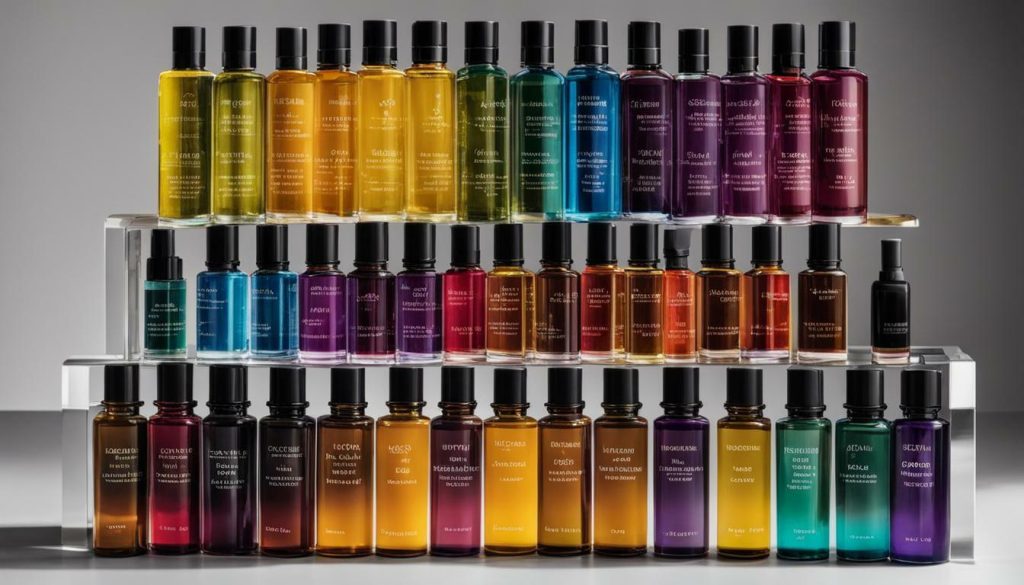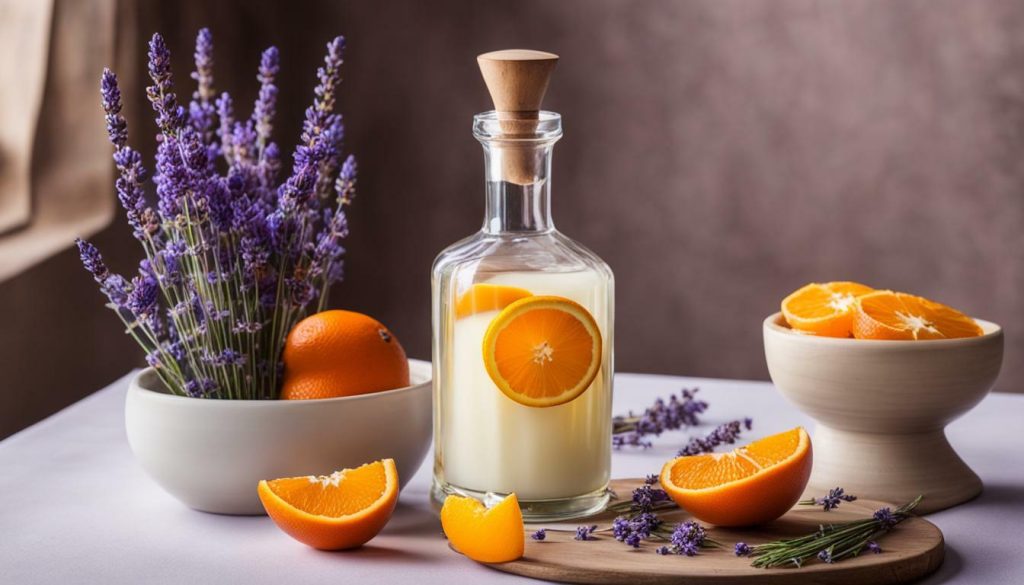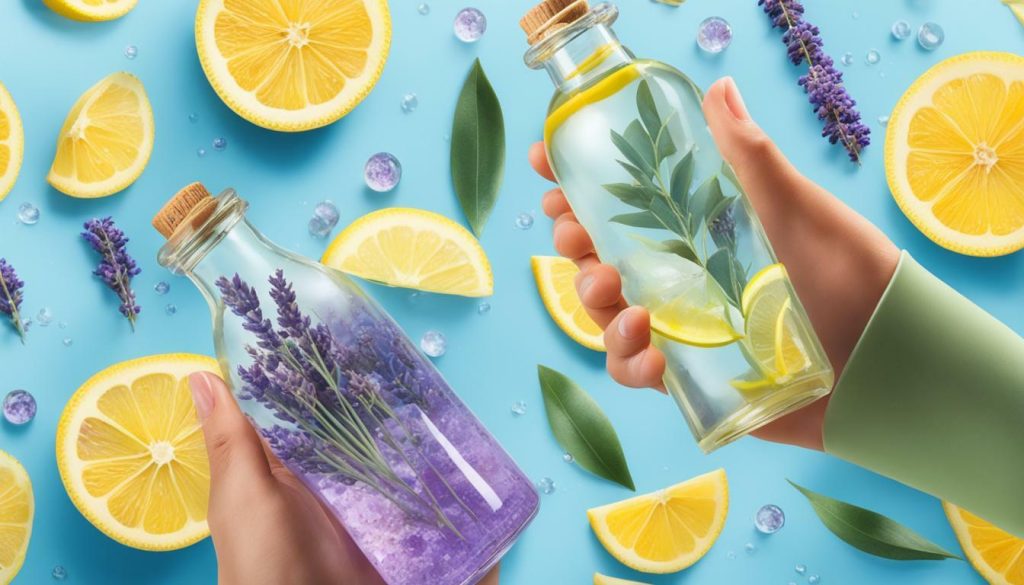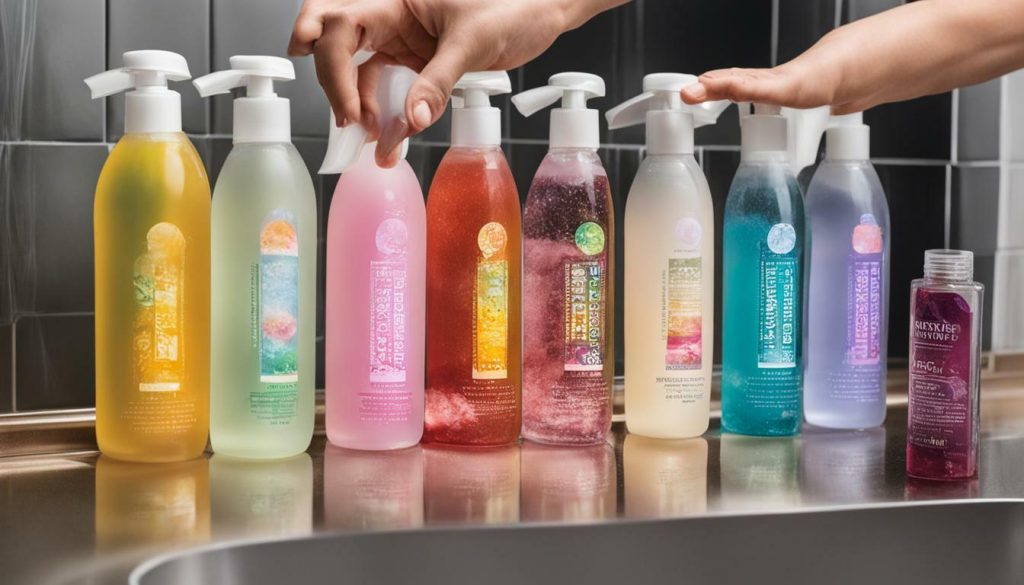If you’re looking for a way to customize your shower routine and avoid harsh chemicals, why not try making your own body wash? With just a few key ingredients and our helpful guide, you can create a luxurious and nourishing body wash that’s tailored to your skin’s needs.
Making your own body wash is not only a fun DIY project but also a cost-effective way to indulge in a little self-care. Whether you prefer a foaming body wash or a creamy one, you can customize the recipe to your liking and benefit from the natural ingredients that you choose. So let’s get started!
Key Takeaways:
- Making your own body wash at home is a great way to avoid harsh chemicals and personalize your bathing experience.
- You only need a few key ingredients to make a luxurious and nourishing body wash.
- Customizing your body wash recipe allows you to target your unique skin needs, such as dryness or sensitivity.
- Storing and using your homemade body wash is easy with a few simple tips.
- Making your own body wash is a fun and rewarding DIY project that can save you money in the long run.
Benefits of Making Your Own Body Wash
If you’re looking for a way to elevate your bathing experience while also taking care of your skin, making your own body wash could be the perfect solution. Here are some of the benefits of creating your own body wash:
- Personalization: When you make your own body wash, you have complete control over the ingredients and can customize the formula to suit your specific skin needs. This means you can create a product that’s tailored to your skin type, scent preferences, and ingredient preferences.
- Avoid harsh chemicals: Many commercial body washes contain harsh chemicals that can strip your skin of its natural oils and cause irritation. By making your own body wash, you can use natural, nourishing ingredients that are gentle on your skin and free of harmful chemicals.
- Cost-effective: Making your own body wash can be a cost-effective alternative to buying expensive, brand-name products. By using simple, affordable ingredients, you can create a luxurious body wash that won’t break the bank.
- Sustainability: When you make your own body wash, you have the option to use sustainable ingredients and reduce your reliance on single-use plastic packaging. By using reusable containers and natural ingredients, you can create a more eco-friendly bathing routine.
In short, making your own body wash offers a range of benefits, from customized formulations to a more sustainable and affordable beauty routine. So why not give it a try and experience the advantages of DIY body wash for yourself?
When it comes to making your own body wash, it’s important to have the right ingredients. Here are some essential components that are often used in body wash recipes:
| Ingredient | Description |
|---|---|
| Liquid Castile Soap | A gentle, natural soap base that provides cleansing properties and helps create lather. |
| Carrier Oils | Oils like sweet almond, jojoba, or coconut oil can help moisturize and nourish the skin, while balancing the cleansing properties of the soap. |
| Essential Oils | These concentrated plant extracts can add fragrance and therapeutic benefits to your body wash. Popular options include lavender for relaxation, peppermint for energy, and tea tree for acne-prone skin. |
| Vitamin E Oil | This powerful antioxidant can help protect the skin from damage caused by free radicals and extend the shelf life of your body wash. |
| Distilled Water | While not always necessary, using distilled water can help prevent bacteria growth and ensure the longevity of your body wash. |
Of course, there are plenty of other ingredients you can experiment with to create a body wash that’s tailored to your preferences. Consider adding honey for extra moisture, aloe vera gel for soothing properties, or even coffee grounds for exfoliation.
When selecting ingredients for your body wash, be mindful of any sensitivities or allergies you may have. Always do a patch test before using a new ingredient, and consult with a healthcare professional if you have any concerns.
Making your own body wash is an easy and fun process that allows you to customize your product to your skin’s needs. Follow the steps below to create your own DIY body wash:
- Measure out 1 cup of liquid castile soap and pour it into a mixing bowl.
- Add 1/4 cup of carrier oil, such as sweet almond, jojoba, or coconut oil. These oils provide nourishment and hydration to your skin.
- Add 1/4 cup of aloe vera juice to soothe and moisturize your skin.
- Choose your favorite essential oils and add a total of 20-30 drops to the mixture. Essential oils not only provide fragrance, but also offer various benefits to your skin. For example, lavender oil is calming, tea tree oil is antibacterial, and peppermint oil is invigorating.
- Mix the ingredients together well, ensuring that there are no clumps or separation.
- Transfer the mixture to a clean and dry container for storage. A pump bottle is ideal for easy dispensing.
- Your DIY body wash is now ready for use. Shake well before each use, and apply a small amount to a loofah or washcloth before massaging onto wet skin. Rinse thoroughly with water.
There you have it! A simple and effective DIY body wash recipe that you can customize to your liking. Try experimenting with different essential oils and carrier oils to find the perfect combination for your skin. Enjoy the benefits of a personalized and natural body wash that leaves your skin feeling clean and nourished.
Customizing Your Body Wash
Creating your own body wash allows you to customize the recipe according to your skin’s unique needs. Whether you have dry, oily, or sensitive skin, you can tailor the formula to suit your preferences. Here are some tips for customizing your body wash for a personalized bathing experience:
- Choose the right oils: Adding carrier oils such as jojoba, coconut, or sweet almond oil can help moisturize and nourish dry skin. For oily skin, opt for lighter oils like grapeseed or apricot kernel oil.
- Add essential oils: Incorporating essential oils not only adds a pleasing scent but can also provide added benefits to your skin. Tea tree oil is great for acne-prone skin, while lavender oil can help calm and soothe sensitive skin.
- Adjust the soap-to-water ratio: Depending on your skin type, you may want to use more or less water when mixing the soap. For dry skin, use a higher ratio of oils and soap to water. For oily skin, use less soap and more water.
Experiment with different combinations of oils and essential oils until you find a recipe that works best for you. Don’t be afraid to make adjustments along the way to achieve your desired consistency and scent. Remember, the beauty of making your own body wash is that you have complete control over what goes into it.
“Creating your own body wash allows you to customize the recipe according to your skin’s unique needs.”
Storing and Using Your Homemade Body Wash
Proper storage is key to ensuring your DIY body wash stays fresh and effective. Follow these tips to get the most out of your homemade creation:
- Store your body wash in a clean, dry container with a tight-fitting lid. Glass jars or plastic bottles with a pump dispenser work well.
- Avoid storing your body wash in direct sunlight or in a humid environment, as this can cause spoilage.
- Label your container with the date the body wash was made, so you can keep track of its shelf life. Generally, a homemade body wash will last for up to three months.
When it comes to using your body wash, here are some tips to keep in mind:
- Shake the container well before each use to ensure the ingredients are mixed properly.
- Use a washcloth or loofah to lather the body wash onto your skin. This will help to create a rich, creamy lather and exfoliate dead skin cells.
- Rinse your skin thoroughly with warm water after using the body wash.
- Pat your skin dry with a towel and apply a moisturizer to lock in hydration and keep your skin soft and supple.
By following these simple guidelines, you can enjoy the full benefits of your DIY body wash and maintain healthy, glowing skin.
By creating your own body wash, you can enjoy a more personalized and healthier bathing experience. Not only do you have control over the ingredients used, but you can also tailor your body wash to meet your specific skin needs.
Remember to take note of the essential ingredients needed to make a luxurious and effective body wash. Don’t be afraid to experiment with different combinations of oils and fragrances to create a scent that’s uniquely yours.
Once you’ve made your homemade body wash, store it properly to extend its shelf life. Airtight containers and a cool, dry place will keep your body wash fresh and ready to use.
With a few simple steps, you can start creating your own body wash today. Treat yourself to a natural and customized skincare routine that leaves your skin feeling clean, nourished, and refreshed.
FAQ
How long does homemade body wash last?
Homemade body wash typically lasts for about 1-2 months. It is important to store it in a cool, dry place and use clean hands or a scoop to avoid introducing bacteria. If you notice any changes in color, texture, or smell, it’s best to discard the body wash.
Can I use any type of oil in my body wash?
While there are many oils that can be used in body wash, it’s important to choose oils that are suitable for your skin type. Some commonly used oils include coconut oil, olive oil, and almond oil. These oils provide nourishment and hydration to the skin. However, if you have oily skin, you may want to opt for lighter oils like grapeseed oil or jojoba oil.
Can I add fragrance to my homemade body wash?
Yes, you can add fragrance to your homemade body wash. Essential oils are a popular choice for adding natural fragrance. Some common essential oils used in body wash include lavender, peppermint, and citrus oils. Make sure to choose high-quality essential oils and use them sparingly, as they are highly concentrated.
Is homemade body wash suitable for sensitive skin?
Homemade body wash can be suitable for sensitive skin, especially if you customize the recipe to avoid harsh ingredients. Consider using gentle cleansers like liquid castile soap and omitting any potential irritants or allergens. It’s also a good idea to do a patch test on a small area of your skin before using the body wash all over.
Can I use my homemade body wash as shampoo?
While some homemade body wash recipes can be used as a shampoo, it’s important to note that the pH levels and cleansing agents needed for hair may differ from those suitable for the body. If you want to use your body wash as a shampoo, make sure to research and adjust the recipe accordingly, or consider making a separate shampoo recipe.

Hey there! I’m Dr. Mary Noland, your trusted authority in dermatology. My 17-year rollercoaster ride in skin science has been nothing short of a masterclass. Whether you’re a newbie or a familiar face, I’m here with open arms and Medicare-friendly services, dedicated to creating your perfect skin haven.
But hold up! There’s more to me. When I’m not elbow-deep in dermatology, I’m lighting up derma blogs with insights that peel back the layers of skin health. Also, as the proud captain of ‘buybodywash.com‘, I provide all the body care goodness you need!
Trust me; I’m more than just a white coat. I’m here to lend an ear, share a laugh, and bring calm with a reassuring voice that’s comforted countless patients.
So, meet Dr. Mary Noland – your dermatologist and your guide and friend on the path to radiant skin. I am excited to meet you soon!

